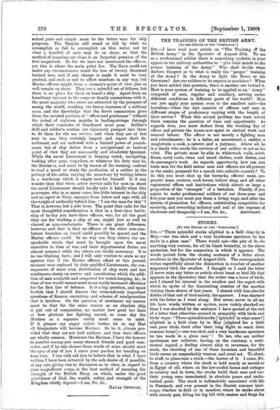THE TRAINING OF THE BRITISH ARMY.
[TO THE EDITOR OF THE "SPECTATOR."]
SIR,—I have read your article on "The Training ot the British Army" in the Spectator of August 25th. To me as a professional soldier there is something pathetic in your appeal to the military authorities to "give their minds to the proper training of the Army." Who shall decide when doctors disagree as to what is really the "proper" training of the Army ? Is the Army to fight the Boers or the Germans ? Are our soldiers to be experts or machines ? When you have settled this question, there is another one behind it. How is your system of training to be applied to an Army" composed of men, regular and auxiliary, serving under different conditions in different parts of the world ? How can you apply your system even to the smallest unit—the battalion—when the unit consists of officers and men in different stages of proficiency varying with the length of their service ? When this second problem has been solved there remains the question of time and opportunity. As regards time, you must deduct from the working day of officer and private the hours now spent in clerical work and manual labour. The officer is not merely a fighting man and schoolmaster; he is a tailor, an accountant, a cashier, a magistrate, a cook, a caterer, and a juryman. Above all, he is a dandy who needs the services of one soldier to act as his valet. The private must be able to whitewash walls, scrub floors, carry coals, clean and mend clothes, wash dishes, and do scavenger's work. As regards opportunity, how can you train men for the field unless men and officers are all present in the ranks, prepared for a march into suitable country ? To do this you must shut up the barracks, officers' mess, ser- geants' mess, canteen, cook-house, tailors' shop, and all other regimental offices and institutions which absorb so large a proportion of the " strength " of a battalion. Finally, if you aspire to make professional soldiers of our three-year and five-year men you must pay them a living wage, and alter the system of promotion for officers, substituting competition for seniority, and rewarding industry and zeal at the expense of
slackness and incapacity.—I am, Sir, &c., ADJUTANT.


































 Previous page
Previous page